Heat pumps are environment-friendly, cheap, and multipurpose units. They keep you warm in the winter and cool in the summer. A thin layer of ice in winter is normal, but a thick layer that doesn’t melt is serious.
The heat pump freezes due to insufficient airflow, stuck reversing valve, defrost mode failure, dirty coils, low refrigerant, and filthy filters. To fix a frozen heat pump, find the frozen area, turn off the heat pump, and turn on the fan in the thermostat.
It is frustrating when a heat pump freezes, but do not panic about the condition. This article will explain the primary reasons behind a frozen heat pump and how to unfreeze it.
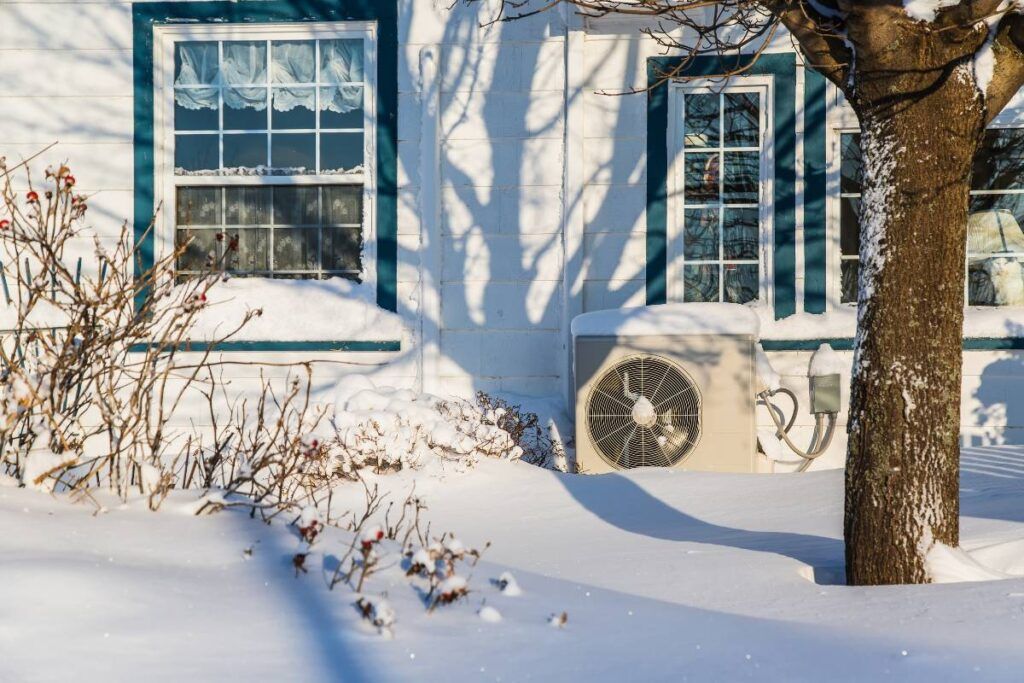
Check out our list of top-handpicked products for all your electrical, appliance, and HVAC system needs to keep your home running smoothly.
This post includes some affiliate links.Why does the heat pump freeze?
It is quite normal for the heat pump to freeze in winter.
If a thin layer of ice disappears after 30 to 90 minutes, it is normal.
The outdoor air contains vapor and changes to ice when the air is very cold.
Heat pumps are prone to freezing during the cold snaps in winter.
But, if the ice does not go away within 30 to 90 minutes, there are other problems, like defrost failure, low refrigerant, etc.
You should not install the external unit in a place where water from the roof or gutters can fall on the unit.
The heat exchanger contains a programmed defrost cycle that heats the condenser gas lines to melt off the ice.
The system also has a temperature sensor on the condenser to provoke the defrost cycle during too much ice buildup.
The sensor’s location is critical because it influences the defrost cycle to kick on.
A heat pump can also freeze up in hot summers, but the problem will be serious.
It is the time when you need the air conditioner to work at its best the most.
So, summer is a terrible time for the heat pump to freeze and hinder the AC’s performance.
Signs of a frozen heat pump:
- The inner coils of the furnace will freeze up in ice.
- The defrost cycle will fail to activate and work properly.
- The air won’t be pulled into the air conditioning fins.
- Your unit will have a poor heat output. You will feel colder than usual.
- The energy bill of your house will increase.
A frozen heat pump indicates a serious issue, especially if the ice doesn’t melt within 30-90 minutes.
If the ice buildup swells over time, the heat pump is freezing inside too.
1. Defrost control board malfunctioned

The defrost control board is a part of your heat pump system.
It controls the frequency of the heat pump going to the defrost mode.
If the control board’s parts fail, the defrost cycle will not be able to unfreeze the pump.
Common defrost issues include:
- Broken thermostat
- Defrost timer issues
- Broken defrost relay
If you are facing a problem with your heat pump due to the defrost control board, you must hire a technician to look into the matter.
The technician might have to replace the part of the defrost control board that is creating the freezing problem.
2. Defrost mode failure
Besides the control board, other reasons can also hinder the defrost’s functioning.
- Water dripping inside the unit can fail the defrost mode and build up ice in the heat pump.
- If the heat pump fails to drain enough moisture, it will gather in your unit, turn into ice and freeze your pump.
- A wrong installation can also freeze up your heat pump and fail the defrost mode, especially if the unit is placed in a tilted position or lower than the ground level.
Call an HVAC to fix the water buildup and inadequate drainage system.
Ensure the unit is placed over a flat surface and not into the ground. The unit must remain straight.
3. Reversing valve issue
Your system must reverse the refrigerant flow to defrost the heat pump.
Instead of taking heat from the outside and carrying it inside, the heat pump will take the heat from the indoors and carry it to your outdoor unit.
The reversing valve is a part of the heating system that determines the direction of the refrigerant flow.
But, if the valve is broken or malfunctions, the refrigerant flow won’t reverse.
As a result, the heat pump will have a frost buildup which might not melt.
You will need a technician to deal with the problem.
4. Low refrigerant
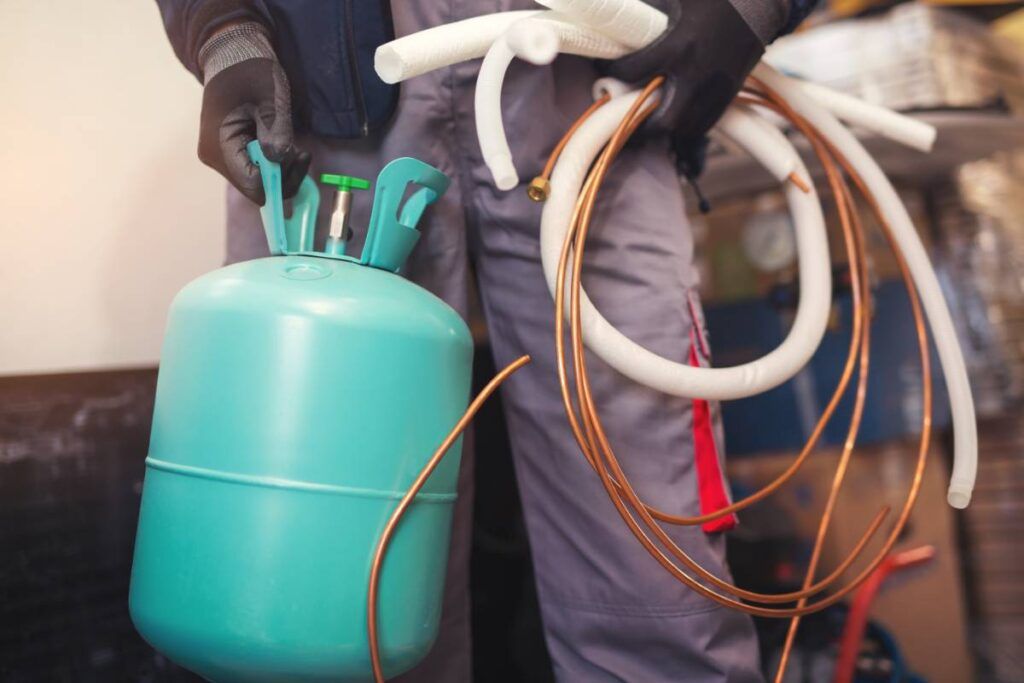
The refrigerant is a fluid that absorbs the heat from the outside and carries it inside your house.
If the heat pump runs out of refrigerant fluid, the heat pump cannot circulate enough air throughout the room, causing the pump to freeze.
Since the refrigerant system is closed-loop, you might be unaware of the leakage and low refrigerant.
Hire an HVAC expert to look into the refrigerant tank and fluid.
They will examine for leaks, replace the tank, and refill the fluid.
Be careful of the technicians who charge for refilling the tank without checking for leaks or repairing them.
5. Restricted airflow
When the airflow is restricted, the heat pump will not extract enough heat to keep the surrounding air comfortable.
It will also cause a defrost cycle failure.
Airflow is restricted due to the dirty filters, and they will prevent smooth airflow through the heat pump.
Over time, the filters get dirty while trapping the dirt and debris in the air particles.
So, check the filters once a month and change them every 3 to 4 months.
Blockages can also happen if the dust and debris enter the heat pump and block the air vents.
For example, twigs, fallen tree branches, pebbles, etc., can block the airflow in the condenser.
Make sure to maintain a 2 to 3 feet distance between the unit and shrubs.
6. Dirty evaporator coil
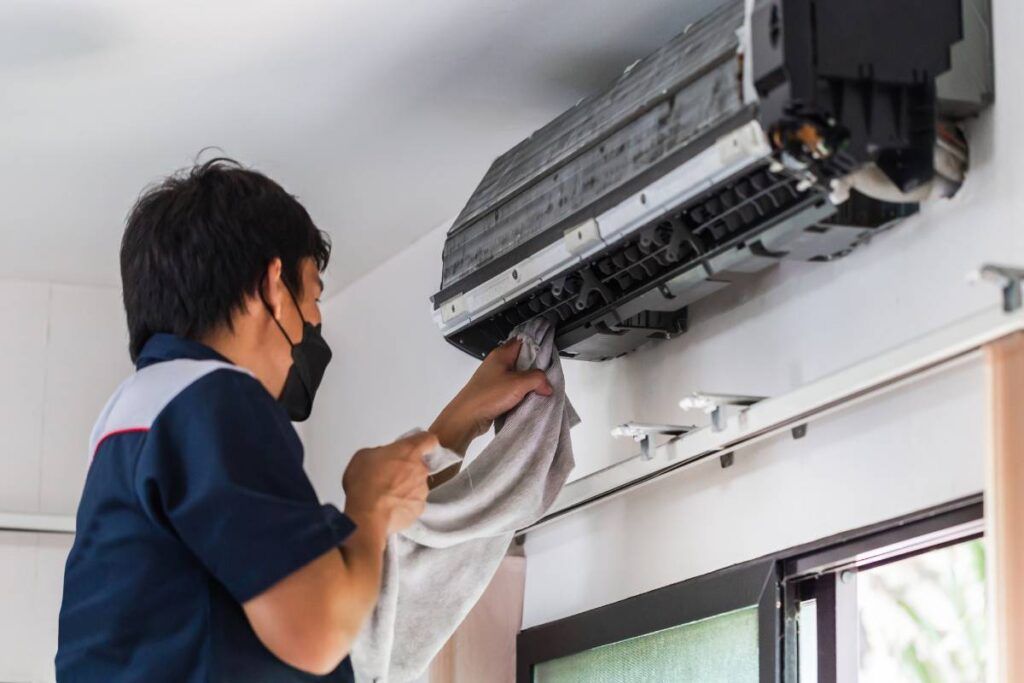
The evaporator coil absorbs the hot air from the surroundings and cools it with the help of the refrigerant liquid.
Over time, the coil will become messy and won’t work efficiently as before.
When it occurs, the heat pump will start freezing up.
If you have dealt with such problems, you can encounter the problem yourself.
Otherwise, you need an experienced HVAC expert to handle the situation.
The coil needs to be cleared, requiring special kits and proper tools so that the fins and the coils do not bend.
7. Faulty thermostat
If the thermostat works incorrectly, it will freeze up the heat pump of your house.
An incorrect thermostat sends wrong signals, for example, telling the evaporator to get too cold.
As a result, your heat pump will freeze, no matter the season.
It would be best to have an HVAC to deal with the matter.
Another thermostat issue is when you set extremely low temperatures.
If you have set a low temperature in your thermostat, the coil will get the signal for the same.
When the condensation freezes, your heat pump will freeze, even if the weather is hot outside.
An average temperature should be 65-70°F.
8. Excessive moisture around the heat pump
When excessive moisture gathers around your heat pump, there could be chances of the heat pump freezing.
Water buildup around the unit is caused due to a broken gutter.
Excessive moisture around the coils that remain uncollected in the drain will freeze inside your heat pump.
You must ensure that no water gathers around the unit or the coil.
You need an HVAC expert to fix the problem.
9. Faulty blower motor

A faulty blower motor will fail to blow the air throughout your house.
So, moisture can gather inside your unit, leading to a freezing heat pump over time, especially in winter.
You need to hire an HVAC to resolve it.
10. Dirty fan blades
When the fan blades of the blower are too filthy, it will restrict the airflow from the unit to your house and exhaust the unit.
As a result, moisture can accumulate in the unit, especially around the coil.
Due to the excessive moisture buildup, your heat pump will not drain this moisture and will turn into ice over time.
Expect the situation to occur mostly in the winter.
Call an HVAC professional to solve the issue.
11. Excessive cold air
Heat pumps can freeze if the weather is too cold to handle.
The standard heat pumps can withstand up to 35 to 40°F, but below 35°F, the unit will get overwhelmed and freeze up.
One of the common signs behind a heat pump freezing up is the condenser freeze-up.
If the temperature outside is too low for the heat pump to tolerate, kicking the unit into defrost mode will fail.
Even if the unit goes to defrost mode, it will have trouble melting the ice.
You can only do something here once and when the weather becomes tolerable.
12. Failed auxiliary heat
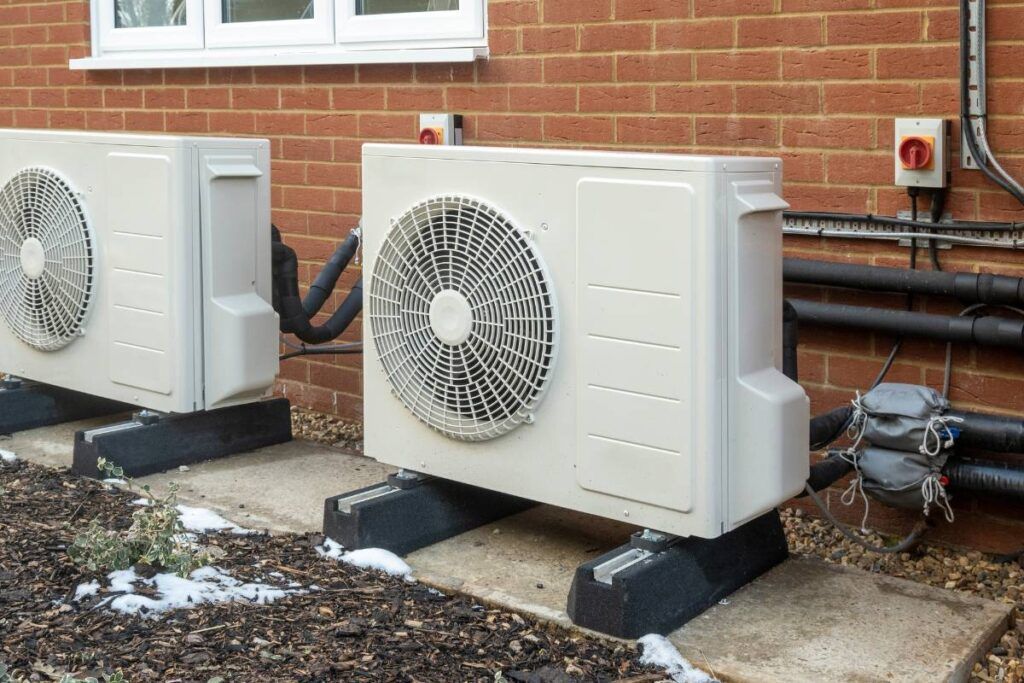
The heat pump gets overwhelmed when the winter arrives, and the temperature goes too low.
The unit will activate a setting called auxiliary heat.
It is a supplement heat source that runs on current.
It keeps you warm even when the heat pump fails to bring the heat inside your house.
The auxiliary heat kicks automatically.
Once the temperature drops too low, the thermostat will signal the auxiliary heat to kick.
Sometimes, the thermostat fails to kick the auxiliary heat, causing the heat pump to freeze.
There is no solution to this. Wait for the temperature to come back to normal.
13. Dripping water
Rain, snow, and water vapor can gather around your unit and ice up on the heat pump in the winter.
It is completely normal in winter.
Besides, the heat pumps are designed to tolerate freezing temperatures.
If your unit’s defrost mode is working fine, it should be able to melt the ice and keep your pump safe.
If not, you need an HVAC to fix the defrost mode and resolve the freezing issue.
14. Slab settling
Heat pumps are mostly placed over concrete slabs.
Do not put the heat pump directly over the ground, as pests can enter your unit easily and cause malfunctioning.
Though putting the unit over a slab is acceptable, a sinking slab can create issues like restricting the airflow or blocking the drainage system.
As a result, the heat pump can freeze up.
Leveling the sinking slab with a longboard should prevent the heat pump from freezing.
15. Problems with the compressor

The compressor is the heart of the heat pump that helps the refrigerant liquid to travel through the system and change the pressure.
If the unit cannot extract the heat due to a faulty compressor, the heat pump will freeze and fail to operate well.
A motor failure will develop issues in the compressor.
If the motor has failed, you won’t hear the compressor after turning on the unit.
Over time, a compressor can wear out, especially due to dirt buildup or poor maintenance.
Another reason behind a bad compressor is its bearings and contacts. They will also wear out over time.
You need an HVAC’s help to fix the compressor issues.
How to prevent the heat pump from freezing in the winter?
Unfortunately, you cannot do much when the heat pump freezes in the winter.
Unless and until the temperature returns to normal, you cannot unfreeze the heat pump.
Some problems will also require an HVAC’s attention.
However, you can follow some tips to prevent or lower the chances of the heat pump freezing up:
Clean the air filters

You must change the air filters every 3 to 4 months.
However, the changing frequency depends on the filter thickness, for example:
- Change a 1 to 2-inch filter every 1 to 3 months
- Change a 2 to 3-inch thick filter every 3 to 6 months
- Change a 5 to 6-inch filter every 9 to 12 months.
If your filter is washable and reusable, you can take out the filter, wash it, and put it back into the heat pump instead of replacing it.
The arrow directions should be the same as before.
Make sure the vents are open.
If your heat pump is ducted, keep the distance between the ducts and your furniture or other objects at least 10 inches for adequate airflow.
If the airflow gets blocked due to the closed or blocked ducts, your heat pumps will freeze.
Some house owners purposely block a few vents when they are not in use to save energy bills.
But that is a bad decision.
It increases the air pressure to other open vents, leading to other damages.
Relevel the heat pump slab.
Work a longboard under one end of the slab, lift it, and put adequate sand under it.
Do the same for the other end of the slab.
You can also replace the slab with a plastic pad.
It should level the slab under the heat pump. Place the heat pump straight and not slanted.
The refrigerant will travel smoothly without interruption when the heat pump stays over a leveled slab.
Remove debris from the heat pump.
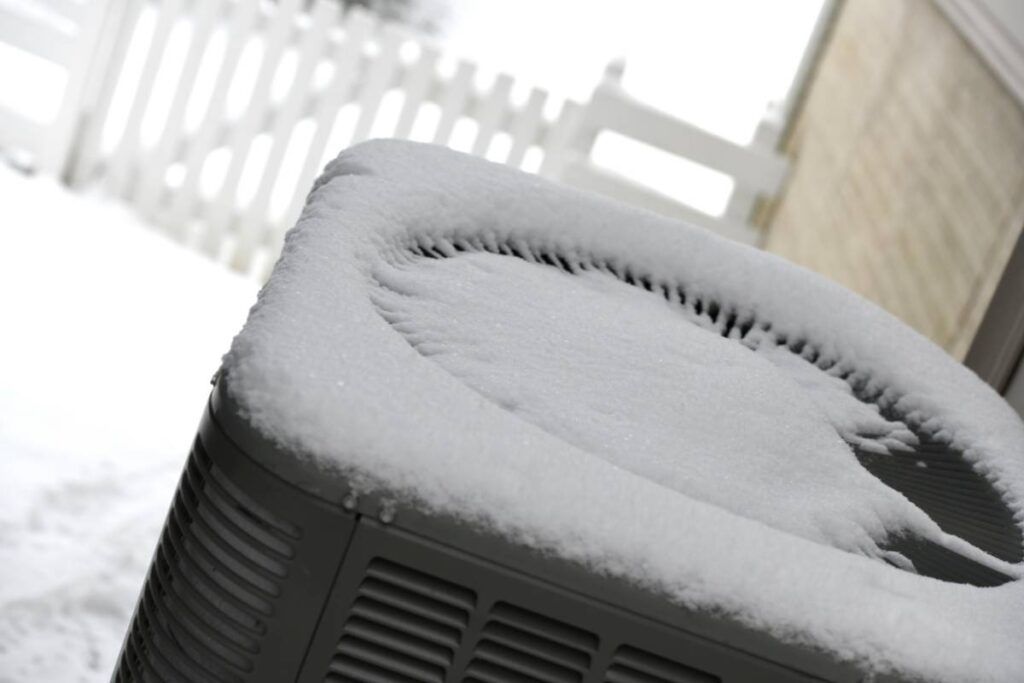
Wear and mow the area around the heat pump to avoid debris buildup around the unit.
Clear the snow and moisture buildup and clean the dirt with a garden hose.
Avoid putting the heat pump in areas where water from the gutter and roof can fall over the unit.
Ensure regular maintenance
Regularly checking the unit’s condition and having annual maintenance and servicing will ensure the unit’s best working condition.
Before the winter season strikes your area, call an HVAC expert for a thorough inspection of the unit to ensure the optimum functionality of the furnace components.
Confirm that all the parts are in good shape, from the fans to the vents.
Keep a close eye during the winter.
During the winter, keep a close eye on your unit.
Since the temperature can drop lower than normal, there could be higher chances of freezing up.
Walk around the outdoor condenser every 1-2 days to check for any airflow blockage and freezing.
Ensure that the ice layer dissipates after some time and does not layer up too thick.
If the ice thickness increases too much and does not vanish within 2-3 days, check for other issues described above.
Immediately, call an HVAC expert to look into the matter.
Final thoughts
A frozen heat pump can cause several issues.
Heat pump freezing in the winter is normal due to the low temperatures.
Besides, the heat pump has a defrost cycle mode that should defrost the ice buildup.
So, the ice buildup will melt within 30 to 90 minutes.
If the ice does not melt within this time, the defrost cycle is at fault, or there are other issues.
So, hire a professional to resolve the frozen heat pump.
Also read: 12 Reasons Your Heat Pump Is Running Constantly (+Fix)
At what temperature will the heat pump freeze?
If the temperature is below 70°F, the heat pump has a high chance of freezing.
However, your unit won’t freeze up immediately. It will freeze if the temperature remains this low for a long time.
Can I use warm water for a frozen heat pump?
Yes, you can pour warm water on the frozen heat pump. It will speed up the defrosting process.
